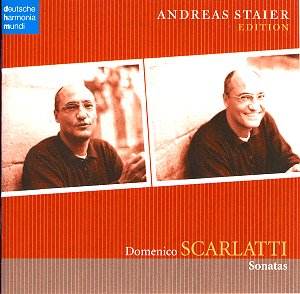Domenico Scarlatti
wrote about 550 keyboard sonatas in
total. They are relatively short, generally
have a similar binary structure and
yet contain an almost infinite variety
of ideas. It would take most people
a lifetime to get to know all these
works (I have just realized that, at
the current rate of progress, I will
need to survive until a letter arrives
from King William V - UK citizens receive
a letter from the reigning monarch if
they reach 100; I am making a few assumptions
here!) and it might be a problem knowing
where to start. Problem solved; here
would do just fine.
This set is one of
several reasonably priced boxes that
Deutsche Harmonia Mundi have issued
in recognition of the fiftieth birthday
of the harpsichordist and fortepiano
player Andreas Staier. On two well-filled
discs he plays a good selection of 34
sonatas including relatively well known
one such as Kk Nos 96, 141 and 455.
Also on the menu are quite a few that
are likely to be new to all but the
most dedicated Scarlatti sonata collectors,
for example, the first four on the second
disc Kk Nos 420-1 and 263-4 Ė these
are in no way inferior to their more
famous siblings. An important plus is
that, where two sonatas were intended
to be paired together, Staier gives
us both, consecutively and in the order
intended (many recorded programmes seem
to be quite random).
The instrument is a
1982 copy of a German harpsichord from
around 1740 which was made by Keith
Hill from Michigan. It is quite bright-toned
but has been effectively captured in
realistic early 1990s recorded sound.
The discs are well-presented in a slim-line
cardboard box and slipcases; unusual
in my experience for a two disc set.
The booklet has good notes on the composer
and artist plus a short essay on the
anatomy of a Scarlatti sonata by the
great guru Ralph Kirkpatrick.
Staierís technique
is prodigious. These are generally fast,
highly rhythmic performances in which
he exhibits wonderful articulation.
Despite relatively little overt interpretation
(which these wonderful works generally
donít need), the playing on these discs
grabs oneís attention and never lets
go.
The potential for comparisons
in Scarlatti is almost endless and yet
there is nothing really directly comparable
with this set. Indeed every recording
artist who has tackled Scarlatti has
probably put together a unique programme.
The nearest I have to hand is a three-disc
anthology from Scott Rossís complete
Erato set on the harpsichord, which
overlaps quite a bit and is also excellent.
In Kk141, and indeed generally, Ross
is rather more sedate and cultured.
I marginally prefer his instrument (a
better bass register) but Staierís "hell-for-leather"
approach won me over in this sonata.
He is not the fastest on disc, Mikhail
Pletnev - on the piano, of course -
just pips him in his fascinating set
of recordings for Virgin. But he also
provides a layer of Pletnev to which
one may or may not warm; I mostly do.
Also on the piano, Joanna MacGregor,
originally for Collins Classics, now
on Sound Circus is more "Ross-like"
in approach. Similar trends emerge from
comparison of Staier and Ross in Kk
455 but here my piano version is played
by Vladimir Horowitz, whose interpretive
approach is rather similar to Pletnevís.
Back on the harpsichord, Ralph Kirkpatrick
also recorded this sonata in 1970 and
his version withstands comparison with
any.
In Kk 96, marked Allegrissimo
and one of the best known of all, Staier
is relatively fleet and completely convincing
but Scott Ross is equally fine here.
On the piano, Horowitz is the speediest
by some margin but he misses the grandeur.
Peter Katin on Claudio is magisterial
at a slowish tempo and with tasteful
pedalling. To my ears Pletnev overdoes
things in this sonata and his tempo
changes sound contrived. At this point
I gave up making comparisons, mindful
of the need to finish the review before
Christmas. All the artists mentioned
above have made recommendable Scarlatti
discs. I would not want to be without
any of them but I am sure I will return
to Staierís collection frequently.
Some listeners may
have a strong allegiance to Scarlatti
being played only on the harpsichord
or piano but I would argue that this
composerís music works well on either
instrument. Unless you are wedded to
the piano, Staierís offerings seem to
be essential. If you are so wedded,
may I suggest a divorce or at least
a trial separation in the form of an
audition of this wonderful set?
Patrick C Waller

![]() Andreas Staier (harpsichord)
Andreas Staier (harpsichord) ![]() DEUTSCHE HARMONIA MUNDI 82876 67375 2 [69:40
+ 71:00]
DEUTSCHE HARMONIA MUNDI 82876 67375 2 [69:40
+ 71:00]













